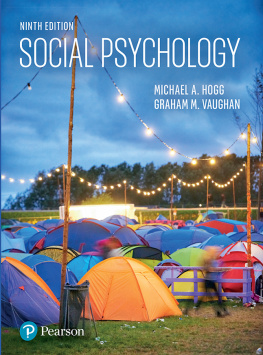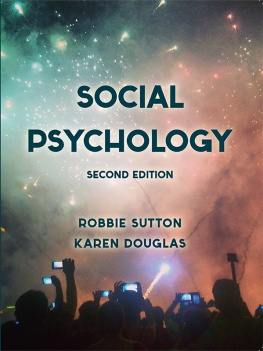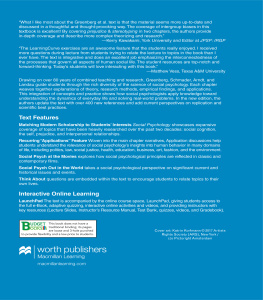C.M. Fleming - The Social Psychology of Education
Here you can read online C.M. Fleming - The Social Psychology of Education full text of the book (entire story) in english for free. Download pdf and epub, get meaning, cover and reviews about this ebook. year: 2013, publisher: Routledge, genre: Romance novel. Description of the work, (preface) as well as reviews are available. Best literature library LitArk.com created for fans of good reading and offers a wide selection of genres:
Romance novel
Science fiction
Adventure
Detective
Science
History
Home and family
Prose
Art
Politics
Computer
Non-fiction
Religion
Business
Children
Humor
Choose a favorite category and find really read worthwhile books. Enjoy immersion in the world of imagination, feel the emotions of the characters or learn something new for yourself, make an fascinating discovery.

- Book:The Social Psychology of Education
- Author:
- Publisher:Routledge
- Genre:
- Year:2013
- Rating:3 / 5
- Favourites:Add to favourites
- Your mark:
- 60
- 1
- 2
- 3
- 4
- 5
The Social Psychology of Education: summary, description and annotation
We offer to read an annotation, description, summary or preface (depends on what the author of the book "The Social Psychology of Education" wrote himself). If you haven't found the necessary information about the book — write in the comments, we will try to find it.
The Social Psychology of Education — read online for free the complete book (whole text) full work
Below is the text of the book, divided by pages. System saving the place of the last page read, allows you to conveniently read the book "The Social Psychology of Education" online for free, without having to search again every time where you left off. Put a bookmark, and you can go to the page where you finished reading at any time.
Font size:
Interval:
Bookmark:

| I | Adolescent Girls in Approved Schools | Richardson |
| II | Adult Education | Peers |
| III | Down Stream | Dale and Griffith |
| IV | Education After School | Stimson |
| V | Education and Society | Ottaway |
| VI | Education and Society in Modern France | Fraser |
| VII | Education and Society in Modem Germany | Samuel and Thomas |
| VIII | Education and the Handicapped: 17601960 | Pritchard |
| IX | Education in Israel | Bentwich |
| X | Education in Transition | Dent |
| XI | The Education of the Countryman | Burton |
| XII | The Educational Thought and Influence of Matthew Arnold | Connell |
| XIII | English Primary Education (Part One): Schools | Blythe |
| XIV | English Primary Education (Part Two): Background | Blythe |
| XV | From School to University | Dale |
| XVI | Helvetius | Cumming |
| XVII | Mission of the University | Ortega y G asset |
| (The above title is not available through Routledge in North America) | ||
| XVIII | Parity and Prestige in English Secondary Education | Banks |
| XIX | Problems in Education | Holmes |
| XX | The School Inspector | Edmonds |
| XXI | The Sixth Form and College Entrance | Morris |
| XXII | Social Class and the Comprehensive School | Ford |
| XXIII | The Social Psychology of Education | Fleming |
| XXIV | The Social Purposes of Education | Collier |
| XXV | Social Relations in a Secondary School | Hargreaves |
| XXVI | Total Education | Jacks |
| XXVII | Values and Involvement in a Grammar School | King |
| XXVIII | Who Shall Be Educated? | Warner, Havighurst and Loeb |
| (The above title is not available through Routledge in North America) |

This has not been possible in every case, however, and we would welcome correspondence from those individuals/companies we have been unable to trace.
| CHAP. |
Font size:
Interval:
Bookmark:
Similar books «The Social Psychology of Education»
Look at similar books to The Social Psychology of Education. We have selected literature similar in name and meaning in the hope of providing readers with more options to find new, interesting, not yet read works.
Discussion, reviews of the book The Social Psychology of Education and just readers' own opinions. Leave your comments, write what you think about the work, its meaning or the main characters. Specify what exactly you liked and what you didn't like, and why you think so.











